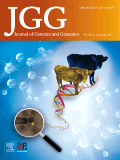
TRENDS IN GENETICS
Scope & Guideline
Advancing the Frontiers of Genetic Research
Introduction
Aims and Scopes
- Genetic Mechanisms and Regulation:
Exploration of the genetic mechanisms that regulate gene expression, including transcription factors, enhancers, and epigenetic modifications. This area emphasizes understanding how genetic regulation impacts development and disease. - Evolutionary Genetics:
Investigations into the genetic basis of evolutionary change, speciation, and adaptation. This includes studies on population genetics, phylogenetics, and the role of genetic variation in adaptation to environmental changes. - Clinical Genetics and Genomics:
Research focusing on the implications of genetic discoveries for human health, including genetic disorders, cancer genomics, and the potential for gene therapy and precision medicine. - Epigenetics and Non-coding RNAs:
Examination of epigenetic modifications and the roles of non-coding RNAs in gene regulation and cellular processes, contributing to our understanding of complex traits and diseases. - Technological Advances in Genomics:
Development and application of innovative genomic technologies, including CRISPR, next-generation sequencing, and bioinformatics tools, to enhance our understanding of genetics. - Genetic Diversity and Conservation:
Studies on genetic diversity within species and its implications for conservation biology, addressing the impact of genetic variation on biodiversity and ecosystem resilience.
Trending and Emerging
- Integration of Multi-omics Approaches:
There is a growing trend towards integrating various omics technologies (genomics, transcriptomics, proteomics) to provide a more comprehensive understanding of biological systems and disease mechanisms. - Applications of CRISPR and Gene Editing:
The application of CRISPR technology for genome editing has surged, with a focus on its therapeutic potential, ethical considerations, and innovative uses in research and agriculture. - Genetic Contributions to Complex Traits and Diseases:
Research on the genetic basis of complex traits and diseases is expanding, emphasizing polygenic risk scores and the contributions of rare variants to phenotypic diversity. - Environmental and Epigenetic Interactions:
An increasing number of studies are exploring how environmental factors interact with genetic and epigenetic mechanisms, impacting health, development, and evolution. - Neurogenetics and Behavioral Genetics:
Emerging research in neurogenetics focuses on the genetic underpinnings of behavior and neurodevelopmental disorders, linking genetic variation to cognitive and behavioral phenotypes.
Declining or Waning
- Classical Mendelian Genetics:
Research related to traditional Mendelian inheritance patterns seems to be declining, as the field increasingly embraces more complex genetic interactions and the influence of polygenic traits. - Basic Genetic Mapping Techniques:
The decline in focus on classical genetic mapping methods may be observed, as newer technologies and approaches such as genome-wide association studies (GWAS) and whole-genome sequencing dominate the landscape. - Historical Perspectives on Genetics:
While historical studies provided valuable insights, the current trend indicates a reduced emphasis on revisiting historical genetic concepts in favor of more contemporary applications and discoveries.
Similar Journals

BIOCHEMICAL GENETICS
Unraveling the Complexities of Life at the Molecular LevelBIOCHEMICAL GENETICS, published by Springer/Plenum Publishers, is a prominent journal in the fields of biochemistry, genetics, and molecular biology, with a substantial impact on the scientific community since its inception in 1967. The journal holds a significant position within various academic quartiles, ranking Q2 in Ecology, Evolution, Behavior and Systematics, and Q3 in Biochemistry, Genetics, and Medicine (miscellaneous), among others, demonstrating its diverse and interdisciplinary reach. With an ISSN of 0006-2928 and an E-ISSN of 1573-4927, it is recognized for contributing critical research insights and methodologies that drive the fields of biochemical genetics forward. Although it is not an Open Access journal, it provides vital access options and resources for researchers globally, facilitating the dissemination of knowledge across institutions. Positioned within the competitive landscape of Scopus rankings, it maintains respectable standings across its focused areas, making it an invaluable resource for researchers, professionals, and students seeking to deepen their understanding of genetic mechanisms and biochemical processes.

RUSSIAN JOURNAL OF GENETICS
Exploring the Frontiers of Genetic ResearchRUSSIAN JOURNAL OF GENETICS is a significant platform in the field of genetics, published by PLEIADES PUBLISHING INC since its inception in 1996. With an ISSN of 1022-7954 and an E-ISSN of 1608-3369, the journal focuses on a wide array of topics within genetics, providing researchers, professionals, and students with insights into advancements and discoveries in this ever-evolving discipline. While it currently holds a Q4 ranking in the 2023 Genetics category according to Scopus, representing invaluable opportunities for knowledge dissemination, the journal is actively working to enhance its impact in future rankings. Readers will find the journal a repository of diverse genetic research findings, methodologies, and theoretical advancements. Although it is not an open-access journal, it is committed to serving the academic community through rigorous peer-reviewed articles. With a consistent publication trajectory spanning to 2024, the RUSSIAN JOURNAL OF GENETICS remains a crucial resource for those aspiring to stay at the forefront of genetic research and applications.

GENES & GENETIC SYSTEMS
Fostering Collaboration in Molecular BiologyGENES & GENETIC SYSTEMS, an esteemed journal published by the Genetics Society of Japan, serves as a vital platform for the dissemination of innovative research within the fields of genetics, molecular biology, and medicine. Established in 1996 and based in Mishima, Shizuoka, Japan, this journal has actively contributed to the academic community, fostering collaboration and knowledge sharing among researchers and professionals. The journal’s impact can be seen through its category quartiles, which reflect its position in Genetics, Molecular Biology, and Medicine, and while it currently ranks in Q4 in Genetics and Q3 in Medicine (miscellaneous), it is poised for growth as it continues to publish pivotal studies. With a commitment to open access, GENES & GENETIC SYSTEMS ensures that research findings are freely accessible to the global scientific community, promoting a more inclusive approach to knowledge distribution. This journal is essential for students, researchers, and professionals seeking to stay informed of advancements in genetic research and its implications for the broader field of medicine.

GENOME
Connecting Researchers to the Heart of GenomicsGENOME is a leading peer-reviewed journal published by Canadian Science Publishing, dedicated to advancing the field of genetics, biotechnology, and molecular biology. With a strong commitment to disseminating high-quality research, GENOME has earned a reputable spot in the academic community, boasting a Q2 classification in Biotechnology and Medicine (miscellaneous), and a Q3 rank in Genetics and Molecular Biology for 2023. The journal, identified by its ISSN 0831-2796 and E-ISSN 1480-3321, publishes innovative studies that span from 1987 to 2024, ensuring a rich historical context while addressing contemporary challenges in the field. Researchers and professionals are encouraged to contribute and engage with content that shapes the landscape of genetic research. Although the journal does not currently provide open access, it remains a vital resource for those committed to the exploration of genomic sciences, making it an essential read for both seasoned researchers and students alike.

Journal of Genetics and Genomics
Bridging Theory and Practice in GeneticsThe Journal of Genetics and Genomics, published by SCIENCE PRESS in China, stands as a significant contributor to the fields of Genetics and Molecular Biology. With an ISSN of 1673-8527 and E-ISSN 1873-5533, this esteemed journal has achieved a remarkable reputation, holding a prestigious Q1 ranking in both Genetics and Molecular Biology as of 2023. This journal not only showcases pioneering research but also fosters vital discussions on contemporary challenges and innovations within genomic sciences. As part of its commitment to facilitating scientific advancement, the journal encompasses a range of research articles, reviews, and short communications, all aiming to illuminate the complexities of genetic structures and functions from 2007 to 2024. Researchers, professionals, and students alike are encouraged to engage with its content, which ranks favorably in Scopus—placing it within the top tier of its categories. Join the community of academic excellence and explore the latest findings that shape our understanding of genomics.

Genes
Innovating understanding in clinical genetics and molecular biology.Genes is a leading open-access journal published by MDPI that focuses on advancing the field of genetics and genomics. Established in 2010 and based in Basel, Switzerland, this journal has made significant strides in promoting innovative research in both clinical genetics and molecular biology. With an impact factor reflecting its relevance and quality, Genes has been classified in the Q2 quartile for Genetics and the Q3 quartile for clinical Genetics as of 2023. The journal provides an accessible platform for researchers, professionals, and students to disseminate their findings and explore emerging trends across the genetics landscape. Accessible online since its inception, Genes allows for continuous engagement and collaboration within the scientific community, fostering a deeper understanding of genetic mechanisms and their implications in health and disease.

Global Medical Genetics
Bridging the Gap Between Genetics and Clinical PracticeGlobal Medical Genetics is a premier open-access journal dedicated to advancing the field of medical genetics. Published by GEORG THIEME VERLAG KG, this journal has been providing a dynamic platform for disseminating cutting-edge research and clinical findings since its inception in 2020. With the ISSN 2699-9404, it serves as an essential resource for researchers, healthcare professionals, and students who seek to explore the complex interplay between genetics and medicine. The journal aims to foster collaboration and innovation in the genetics community, addressing a diverse range of topics from genetic disorders to the application of genomics in personalized medicine. By providing open access to its content, Global Medical Genetics enhances knowledge sharing and accelerates advancements in healthcare, making it a vital asset for anyone invested in the future of genetics.

PLoS Genetics
Unlocking the mysteries of genetics, one breakthrough at a time.PLoS Genetics, published by the PUBLIC LIBRARY SCIENCE, is a leading open-access journal dedicated to advancing the field of genetics, molecular biology, and related disciplines. With its ISSN of 1553-7404, this esteemed journal has been offering unrestricted access to its content since 2005, fostering a global community of researchers, professionals, and students. Situated in the United States, its contributions can be found at 1160 Battery Street, Ste 100, San Francisco, CA 94111. As of 2023, PLoS Genetics proudly holds a Q1 ranking in multiple categories including Cancer Research, Ecology, Evolution, Behavior and Systematics, Genetics, and Molecular Biology, underscoring its impact in these vital scientific areas. The journal's commitment to disseminating high-quality research is reflected in its impressive Scopus rankings, with notable positions in various fields of study, ensuring that it remains a crucial resource for cutting-edge research and innovation. By providing an open-access platform, PLoS Genetics not only enhances the visibility of genetic research but also encourages collaborations and the sharing of knowledge that can lead to significant breakthroughs in science.

Human Genomics
Fostering Global Collaboration in Genetic StudiesHuman Genomics, published by BMC, is a leading open-access journal dedicated to advancing the field of genomics and its applications in health and disease. Since its inception in 2003, the journal has provided a vital platform for researchers to disseminate groundbreaking findings related to genetic research, contributing significantly to areas such as Drug Discovery, Genetics, Molecular Biology, and Molecular Medicine, as reflected in its Q1 and Q2 quartile rankings throughout 2023. With an ISSN of 1473-9542 and an E-ISSN of 1479-7364, Human Genomics not only delivers high-quality, peer-reviewed research but also ensures accessibility to a broader audience, empowering professionals, students, and academics to stay at the forefront of genomic science. Through its rigorous editorial standards and impactful publications, the journal fosters a collaborative environment for innovative research across the globe from its base in the United Kingdom. By promoting open access since its launch, Human Genomics continues to enhance the visibility and impact of genetic studies, making it an essential resource for anyone involved in the rapidly evolving field of human genomics.

Molecular Genetics & Genomic Medicine
Fostering global dialogue in molecular biology.Molecular Genetics & Genomic Medicine, published by WILEY, is an esteemed and open-access journal that has been a prominent source of knowledge in the fields of genetics and molecular biology since its establishment in 2013. With an ISSN of 2324-9269, it aims to provide a platform for the dissemination of novel findings and innovative research that pushes the boundaries of genomics and its clinical applications. The journal holds a Q3 categorization in Genetics, Clinical Genetics, and Molecular Biology, reflecting its growing influence in these disciplines, as evidenced by its Scopus rankings. Researchers, professionals, and students alike will find valuable insights and advancements in genomic medicine, making this journal an essential resource for those dedicated to the understanding and application of genetic and molecular research in healthcare. Located at 111 River St, Hoboken, NJ, Molecular Genetics & Genomic Medicine continues to foster a global dialogue within the scientific community, ensuring accessible knowledge for all.